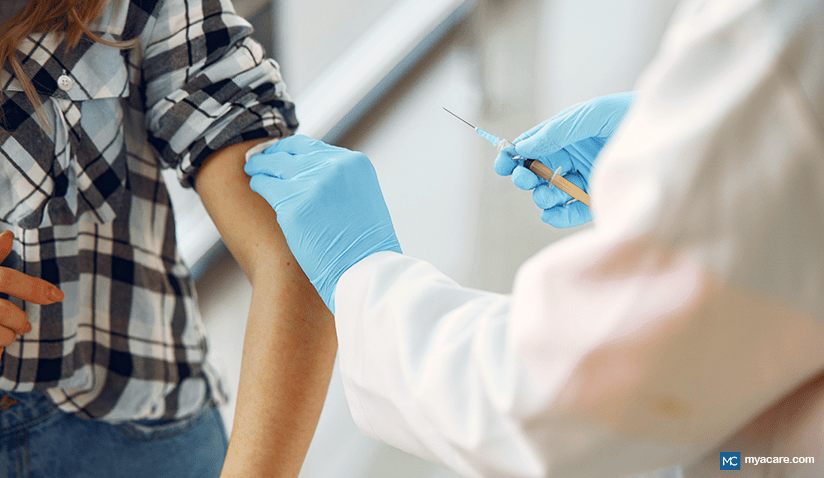ANSWERING 8 CORONA-VACCINE MISCONCEPTIONS & CONSPIRACIES

Internet said that we shouldn’t take the vaccine
mRNA vaccines have not been tested on humans
Someone took the vaccine and still got infected
Updated 19th October 2021
This article is continuously updated.
As the new year begins, the corona pandemic is still going strong. Thanks to outstanding international efforts and collaboration, many countries have already started vaccinating their citizens with one of several approved vaccines.
The currently approved COVID vaccines include two mRNA vaccines (Pfizer/BioNTech and Moderna vaccines) and three traditional vaccines (Oxford/AstraZeneca, Sputnik V, Sinopharm, and CoronaVac), and they provide immunity against coronavirus with up to 95% efficiency.
As soon as news of the vaccines started making headlines, self-proclaimed experts and anti-vaxxers started spreading misleading information urging people not to take the vaccine. From electronic tracking chips to big pharma conspiracies, fake news and misconceptions about the corona vaccine have filled the internet, and many users sadly fall victim to this news. So, we’ve decided to clear up some points and answer some of these insane claims. Here are the top reasons why some people say they won’t take the COVID vaccine, and how you can answer them:
1. Someone on the internet said that we shouldn’t take the vaccine
You should know that an internet video or a random article on a news website are not credible sources. Even if someone claims they’re a doctor, a professor, or a scientist, they’re still not considered a credible source. Science is based on experiments, evidence, and scientific consensus and not on individual theories and claims. This means that the only credible sources that can be trusted to provide accurate information about the vaccines are international and national health authorities like the World Health Organization (WHO), Center of Disease Control (CDC), the Food and Drug Administration (FDA), and local health authorities and ministries. These authorities have experts who analyze all the data provided by doctors and scientists worldwide and develop conclusions and recommendations for professionals and the public. Currently, all reputable health authorities agree that the available vaccines are safe, effective, and necessary to end the pandemic.
2. The vaccines were rushed and were not properly tested
It’s true; the corona vaccines that are rolling out have been developed at record speed. However, they were not rushed, and no corners were cut to speed up the process. Thanks to incredible international collaboration and massive funding, scientists were able to quickly create the vaccines and swiftly test them on thousands of volunteers in just a few months without any obstacles. All the approved vaccines, like the Moderna, Pfizer/BioNTech, Oxford/AstraZeneca, Sputnik V, Sinopharm, and CoronaVac vaccines, have been tested on tens of thousands of volunteers, and strict study protocols were followed during all testing phases. Moderna, Pfizer/BioNTech, and Oxford/AstraZeneca have made all their protocols public and accessible to other researchers. Pfizer even published their Phase III trial interim results in one of the top peer-reviewed medical journals, The New England Journal Of Medicine (NEJM).
3. mRNA vaccines have not been tested on humans before and can disrupt your genes
The two vaccines by Moderna and Pfizer/BioNTech utilize a very new technology called mRNA vaccines, and this has got many skeptics spreading false information. This medical breakthrough has been in development for over 3 decades; it has been tested in human trials for the past 10 years, especially in cancer treatment. So, saying that mRNA vaccines have not been tested in humans is not very accurate. Many mRNA-based treatments have been developed and tested in the past few years, and the modality seems safe without any serious long-term effects.
One of the fastest fastest spreading rumors on social media platforms is that they can disrupt your genes, and it’s very far from true. Supporters of this misconception claim that since mRNA is a form of viral genetic material, it has the potential to integrate with your own cells and disrupt your genes. This is, however, scientifically wrong. There’s currently no evidence that mRNA can come near your chromosomes, let alone disrupt them. The mRNA molecules introduced to the body by the Moderna and Pfizer/BioNTech vaccines enter your cells and get translated (by your cellular machinery) into the “spike” protein (a protein specific to COVID-19) to induce immunity. mRNA does not enter your nucleus where your genes are and has no potential to alter your DNA.
4. The vaccines contain chips to gather information about us
There are many variants and additions to this interesting conspiracy theory. Some claim that this mass “chipping” is funded by the one and only Bill Gates, Microsoft CEO. Others go as far as claiming that these “chips” can control our minds and behavior. The vaccines have been mass-distributed worldwide and can be tested by anyone. However, not a single proof is available to support this claim so far. Moreover, if companies want your information, there’s always social media (just saying).
5. The vaccine will infect you with corona
This misconception stems from the fact that live-attenuated viruses carry the risk of reactivation on rare occasions. A live attenuated vaccine is a vaccine that would be made from a weakened version of the actual coronavirus. Nevertheless, none of the vaccines cited in this article were developed using this technology, and therefore, there is absolutely no scientifically sound way in which the available vaccines can cause infection.
6. Someone took the vaccine and still got infected
Yes, that’s possible. However, it does not mean you shouldn’t take the vaccine nor that it’s not effective. Building immunity against COVID-19 takes time, and you can still get infected if you get exposed to the virus before 3-4 weeks have passed from the date of vaccination. Moreover, the currently available vaccines are up to 95% effective in preventing corona infections, so there’s a chance you might still get infected even if you get vaccinated.
7. If you were already infected, you don’t need vaccination
According to available data, getting infected by corona does not give you permanent immunity, and there’s a chance you might be infected for a second time. This is why it’s important to get vaccinated even if you got infected and recovered from corona already.
Sadly, fake news and misconceptions spread a lot faster than the truth. Don’t believe everything you hear or see on the internet without going back to credible sources like the WHO, CDC, and FDA. This pandemic has already done enough damage and, now more than ever, it’s time to trust science to help us end it.
8. Getting vaccinated when you’re pregnant can cause miscarriages
The misconception arose when inaccurate information came to light regarding the similarities between the coronavirus spike protein and syncytin-1. Syncytin-1 is a protein needed for placental formation at the beginning of pregnancy. The myth is that the vaccine would encourage your body to attack the syncytin-1 because of the similarity, leading to a miscarriage.
The myth that the COVID-19 vaccine can cause miscarriages is precisely that - a myth. Research reveals there is no similarity between syncytin-1 and the coronavirus spike protein, and there is no risk of the vaccine causing an attack on your placenta if you ever decide to get pregnant.
An analysis by the CDC reported that there was no increase in miscarriages among vaccinated pregnant women, reassuring the safety of the vaccine. The CDC has deemed the vaccine safe for pregnant women, women trying to get pregnant, and breastfeeding women.
It’s possible that this misconception has spread due to the fact that COVID-19 seems to be more severe in unvaccinated pregnant women. In fact, from July to September, 1 in every 6 critical COVID patients in the UK were pregnant women who did not yet get the vaccine.
Similar concerns also arose in Sri Lanka, where the government has recommended that patients delay pregnancy in fears of adverse effects of the virus. However, this applies to the actual infection, not the vaccine as rumored. The vaccine, in fact, prevents this from happening.
Bottom line to close on this point: COVID-19 infections can be harmful in non-vaccinated pregnant women. Studies show that the vaccine, on the other hand, is safe in pregnant women and can provide protection against the adverse effects of COVID-19.
To search for Healthcare Providers in India providing COVID-19 Vaccine, please click here.
To search for Healthcare Providers in Malaysia providing COVID-19 Vaccine, please click here.
To search for Healthcare Providers in Poland providing COVID-19 Vaccine, please click here.
To search for Healthcare Providers in Thailand providing COVID-19 Vaccine, please click here.
To search for Healthcare Providers in UAE providing COVID-19 Vaccine, please click here.
To search for the best healthcare providers worldwide, please use the Mya Care search engine.
Sources:
- https://www.pfizer.com/news/press-release/press-release-detail/pfizer-and-biontech-conclude-phase-3-study-covid-19-vaccine
- https://investors.modernatx.com/news-releases/news-release-details/modernas-covid-19-vaccine-candidate-meets-its-primary-efficacy
- https://www.reuters.com/article/us-health-coronavirus-astrazeneca-idUSKBN2830HC
- https://www.amnesty.org/en/latest/news/2020/11/oxford-astrazeneca-vaccine-a-boost-for-global-access-but-huge-inequality-remains/
- https://www.cnbc.com/2020/12/14/covid-vaccine-us-plans-to-ship-6-million-moderna-doses-once-fda-gives-ok.html
- https://www.npr.org/sections/health-shots/2020/12/17/947628608/how-will-moderna-meet-the-demand-for-its-covid-19-vaccine
- https://www.astrazeneca.com/media-centre/press-releases/2020/azd1222-oxford-phase-iii-trials-interim-analysis-results-published-in-the-lancet.html
- https://www.globaltimes.cn/content/1210971.shtml
- https://www.reuters.com/article/us-health-coronavirus-sinovac-brazil/coronavac-efficacy-at-50-90-in-brazilian-trial-says-sao-paulo-official-idUSKBN28Z0PX
- https://www.reuters.com/article/us-health-coronavirus-china-vaccine-idUSKBN2710UQ
- https://www.researchsquare.com/article/rs-798175/v1
Disclaimer: Please note that Mya Care does not provide medical advice, diagnosis, or treatment. The information provided is not intended to replace the care or advice of a qualified health care professional. The views expressed are personal views of the author and do not necessarily reflect the opinion of Mya Care. Always consult your doctor for all diagnoses, treatments, and cures for any diseases or conditions, as well as before changing your health care regimen. Do not reproduce, copy, reformat, publish, distribute, upload, post, transmit, transfer in any manner or sell any of the materials in this blog without prior written permission from myacare.com.



